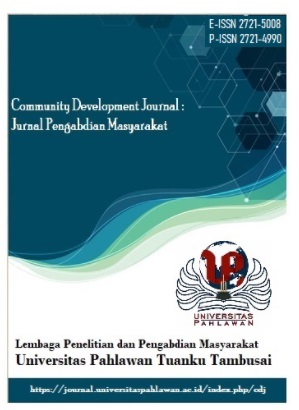EXPLORING EXTENSIVE READING FROM STUDENTS’ PERSPECTIVE
DOI:
https://doi.org/10.31004/jrpp.v6i2.17544Keywords:
extensive reading, reading, students' perceptionAbstract
Extensive reading becomes familiar among students since this activity eases them to read anytime and anywhere they like. Besides, they were also given the freedom to read any kind of book genre. The goal of this activity is to assist students in improving their reading skills. This research design is a descriptive qualitative where the respondents are twelve students of English Language Education Department. This research aims to investigate the students’ perspective toward extensive reading. The data collection was done by interviewing the respondents, doing field observation, and analyzing documents to confirm the data to support the triangulation. The results of the study showed that extensive reading was able to improve students' reading comprehension, increased students’ interest in reading, and built students’ awareness of the importance of literacy and having good reading habits. Furthermore, it should be highlighted that the students and lecturers have the capability and chance to produce readable sources to promote extensive reading at the level of elementary, junior, and senior high school or even at the university level.References
Acth, G. A., Triglyceride, H. D. L., Malodialdehyde, H. D. L., Transfrrin, C., Triglyceride, H. D. L., Malodialdehyde, H. D. L., Transfrrin, C., Hare, L. B., Thomas, D., Miller, C. C., Los, U. M. D. E. C. D. E., Addison, T., Glands, E., Groups, S., Review, R., Guanabara, E., Ltda, K., Guanabara, E., Ltda, K., … Sayer, S. A. (2002). No ????????????????????? ?????????????????Title. Quality Progress, 35(13), 84–85.
Clark, C., & Rumbold, K. (2006). Reading for pleasure: A research overview. National Literacy Trust, November, 35. http://www.scholastic.com/teachers/article/collateral_resources/pdf/i/Reading_for_pleasure.pdf
Day, R. R., Bamford, J., Renandya, W. A., Jacobs, G. M., & yu, V. W. S. (1998). Extensive reading in the second language classroom. RELC Journal, 29(2), 187–191. https://doi.org/10.1177/003368829802900211
Diptoadi, G.?; V. L. (2019). Students’ Perception Of Extensive Reading Activity Through Reading Log Gabriella 3?; Veronica L. Diptoadi 4. Magister Scientiae, 46, 201–215.
Dost, I. N., Bohloulzadeh, G., & Hafshejani, N. K. (2017). The Impact of Teachers’ Personality on Senior High School EFL Learners’ General English Achievement. International Journal of English Literature and Social Sciences, 2(3), 77–93. https://doi.org/10.24001/ijels.2.3.9
Fakazli, Ö. (2021). How does extensive reading promote language development? Article in Journal of International Social Research, 14(78), 499–506. www.sosyalarastirmalar.com
Grabe, W. (2010). Fluency in reading — Thirty-five years later. Readning in a Foreign Language, 22(1), 71–83.
Harris, J. B., & Hofer, M. J. (2011). Technological Pedagogical Content Knowledge (TPACK) in Action. Journal of Research on Technology in Education, 43(3), 211–229. https://doi.org/10.1080/15391523.2011.10782570
Husna, A. H., & Murtini, R. T. (2019). A study on students’ motivation in learning English as English foreign language (EFL) at stikes cendekia utama kudus. Journal of English Teaching and Research, 4(2), 207–220.
https://ojs.unpkediri.ac.id/index.php/inggris/article/download/13745/1377/
Lindawati, R. (2021). Students’ Perceptions Towards Extensive Reading In Efl Contexts. International Journal of English and Applied Linguistics (IJEAL), 1(2), 99–104. https://doi.org/10.47709/ijeal.v1i2.1044
Liu, J., & Zhang, J. (2018). The Effects of Extensive Reading on English Vocabulary Learning: A Meta-analysis. English Language Teaching, 11(6), 1. https://doi.org/10.5539/elt.v11n6p1
Maslina, Y., Rahmi, R., & Mulyani. (2020). the Use of Small Group Discussion in Teaching Reading Comprehension (a Descriptive Study At the Second-Semester Students’ of English Department of Stkip Bina Bangsa Getsempena Banda Aceh). Jurnal Ilmiah Mahasiswa Pendidikan, 1(1).
Nation, I. S. P., & Newton, J. (2008). Teaching ESL/EFL Listening and Speaking. In Teaching ESL/EFL Listening and Speaking. https://doi.org/10.4324/9780203891704
Nation, I. S. P., & Waring, R. (2019). Teaching extensive reading in another language. In Teaching Extensive Reading in Another Language. Routledge. https://doi.org/10.4324/9780367809256
Ng, Q. R., Renandya, W. A., & Chong, M. Y. C. (2019). Extensive reading: Theory, research and implementation. Teflin Journal, 30(2), 171–186. https://doi.org/10.15639/teflinjournal.v30i2/171-186
Poetra, A. A. (2021). Students’ Perception of Extensive Reading Program in English Department of UNESA. Research on English Language Teaching in Indonesia (RETAIN), 09(02), 241–250.
Renandya, W. A., & Jacobs, G. M. (2016). Extensive Reading and Listening in the L2 Classroom. English Language Education, 5, 97–110. https://doi.org/10.1007/978-3-319-38834-2_8
Richard R. Day. (2015). Extending extensive reading. Reading in a Foreign Language, 27(2), 294–301. http://nflrc.hawaii.edu/rfl/October2015/discussions/day.pdf
Shen, Y. (2008). The Effect of Changes and Innovation on Educational Improvement. International Education Studies, 1(3), 73–77. https://doi.org/10.5539/ies.v1n3p73
Smith, T., & Projects, T. I. (1999). R Eading 3. 1968(August 2015).
Student, M. T., Kumar, R. R., Omments, R. E. C., Prajapati, A., Blockchain, T.-A., Ml, A. I., Randive, P. S. N., Chaudhari, S., Barde, S., Devices, E., Mittal, S., Schmidt, M. W. M., Id, S. N. A., PREISER, W. F. E., OSTROFF, E., Choudhary, R., Bit-cell, M., In, S. S., Fullfillment, P., … Fellowship, W. (2021). No ????????????????????? ?????????????????Title. Frontiers in Neuroscience, 14(1), 1–13.
Umam, C. (2019). Extensive Reading: What, Why, and How Extensive Reading: What, Why, and How? *). July. https://www.researchgate.net/publication/334535447
Wijaya, K. (2021). The Important Role of Extensive Reading Strategy in Indonesian EFL Learning Contexts. Acuity: Journal of English Language Pedagogy, Literature and Culture, 6(2), 107–117. https://doi.org/10.35974/acuity.v6i2.2482
Yanto, E. S., Saefullah, H., & Kwary, D. A. (2020). Implementing a literary text extensive reading program through learning logs. Qualitative Report, 25(5), 1393–1411. https://doi.org/10.46743/2160-3715/2020.4111
Downloads
Published
How to Cite
Issue
Section
License
Copyright (c) 2023 Diska Fatima Virgiyanti, Hesti Rokhaniyah; Aries Fachriza

This work is licensed under a Creative Commons Attribution-ShareAlike 4.0 International License.






